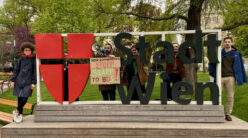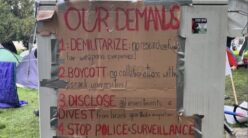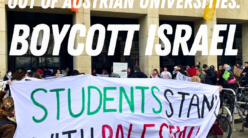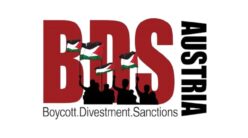“Do not fear what has blown up. If you must, fear the unexploded.”
Für Frauen der Welt und insbesondere für Frauen des globalen Südens ist Palästina und der Widerstand palästinensischer Frauen gegen Kolonialismus, Krieg, Besatzung, Gewalt und Patriarchat Vorbild. Wenn sie die Femizide an ihren Töchtern, Schwestern, Müttern, FreundInnen unvergessen machen. Wenn alles stumm bleibt und sie wissen: wir sind auf uns selbst gestellt, doch wir sind niemals alleine.
Frauen der Welt, in ihren vielen verschiedensten Formen des Widerstands gegen Unterdrückung, Ausbeutung und patriarchale Gewalt, sind mit der Standhaftigkeit und Ausdauer des Kampfes der palästinensischen Frauen verbunden.
Tatsächlich ist der palästinensische Frauenkampf einer der längsten und bekanntesten der Geschichte.
Bereits 1893 waren es Frauen, die gegen den Bau einer jüdischen Siedlung in der Stadt Afula demonstrierten. Frauen gründeten 1933 in der Stadt Yaffa die Organisation Zahrat al-Uqhawan (Chrysanthemenblumen) und verteidigten die Bevölkerung gegen zionistische bewaffnete Banden, bis Yaffa 1948 fiel und die Nakba ihren Lauf nahm.
Während der britischen Mandatszeit in Palästina, 1936, wurde das Dorf Baqa al-Gharbiyeh bombardiert. Als die Armee alle Männer des Dorfes gefangen nahm, stürmten die Frauen nachts mit ihren Kindern die Kaserne und erreichten die Freilassung der Männer.
Auch heute sind es Frauen, die Widerstand gegen die Besatzung leisten, sei es auf der Straße, in der Literatur, im Film oder mittels Kunst, und dafür mit geschlechterspezifischer Gewalt in den israelischen Gefängnissen oder bei Hausdurchsuchungen bestraft werden.
Seit mehr als hundert Jahren, im eingekesselten Gaza, im umzingelten Westjordanland, in den israelischen Gefängnissen, in den tauenden großen und kleinen Flüchtlingslagern der arabischen Länder, im entfernten Exil, im nahen Inneren der Besatzungsmacht, sind es Frauen, die den Widerstand tragen und vorwärts treiben.
Die siedlerkolonialistische israelische Kultur des Todes verhandelt den Körper der palästinensischen Frau als demographische Sicherheitsbedrohung. Das biopolitische und nekropolitische Projekt zur Eindämmung und Verhinderung weiblicher Gebärfähigkeit umfasst eine monströse Kombination aus Kontrollmaßnahmen und Unterdrückungstechniken. Sie zielen auf militärischer, ökonomischer, politischer, sozialer und emotionaler Ebene darauf ab, die Identität und den Körper der palästinensischen Frau auszulöschen:
Durch die ständige Gewalt des israelischen Militärs und der Siedler, der Bedrohung durch Raub des Lebensraums wie Enteignung von Haus und Grund, durch die Verweigerung/Verzögerung der Durchfahrt durch Checkpoints, wenn Frauen zur Geburt in ein Spital gebracht werden müssen, durch die Bombardierungen aus der Luft, wie im Gazastreifen 2008, 2014 und 2020 und den Folgen von Mangel an medizinischer, hygienischer Versorgung und Ernährung, durch Propaganda der Bedrohung und Beleidigung durch israelische PolitikerInnen, wie der israelischen Justizministerin Ayelet Shaked, die befürwortete, auch „die Mütter der Märtyrer“ zu töten und „ihren Söhnen nachfolgen“ zu lassen, sonst würden sie „weitere kleine Schlangen großziehen“.
Doch ein über hundert Jahre währender Frauenwiderstand widersteht all dem. Würden die Stimmen aller Frauen aus der Geschichte der Intifadas, der Märsche gegen Mauer und Zäune, der Demonstrationen gegen Enteignung und Vertreibung auf einmal ertönen; – die Welt würde erbeben.
Frauen in allen Teilen der Welt finden Formen der Solidarität mit Palästina.
Eine davon ist die ungeteilte Unterstützung der BDS-Bewegung. Die von den palästinensischen Zivilgesellschaft 2005 ins Leben gerufene Kampagne ruft auf zu Boykott, Desinvestment und Sanktionen, solange bis die Rechte des palästinensischen Volkes wiederhergestellt sind. BDS ist ein Mittel, um Solidarität mit den Frauen zu demonstrieren und praktische Schritte zu setzen, um den israelischen Siedlerkolonialismus in die Schranken zu weisen. BDS führt – nach dem Vorbild der Anti-Apartheidkampagne gegen das einstige Südafrika – internationale Boykottkampagnen gegen Konzerne, wie Puma oder Hewlett Packard. Sie haben zum Ziel, die Aufmerksamkeit auf die Lage der PalästinenserInnen zu lenken und auf die Ökonomie des Apartheidregimes Druck auszuüben.
Frauen, die sich an BDS beteiligen, wissen, dass Freiheit und Gerechtigkeit nur mit einer langdauernden, kontinuierlichen Anstrengung erreicht werden können. Keine Einschüchterung, keine Schmähung und Verleumdung kann stärker sein, als das Band der Geschwisterlichkeit.
Solidarität macht uns stark.
Beteilige auch Du dich an den Aktivitäten von BDS!
~ ~ ~
“Do not fear what has blown up. If you must, fear the unexploded.”
For women around the world, and especially those of the Global South, Palestinian women act as role models in resisting colonialism, war, occupation, violence and the patriarchy. When femicides are committed against their daughters, sisters, mothers, and friends, they make sure that they are not forgotten. When everyone remains silent, they are aware that they are on their own, but never alone.
Women of the world, in their many different forms of resistance against oppression, exploitation and patriarchal violence, are linked to the steadfastness and perseverance of Palestinian women in their struggle. In fact, the Palestinian women’s struggle is one of the longest and best known in history.
As early as 1893, it was women who demonstrated against the construction of a Jewish settlement in the city of Afula. Women founded the organisation Zahrat al-Uqhawan(Chrysanthemum Flowers) in the town of Yaffa in 1933 and defended the population against Zionist armed gangs until Yaffa fell in 1948 and the Nakba took its course. During the British Mandate in Palestine in 1936, the village of Baqa al-Gharbiyeh was bombed. When the army captured all the men of the village, the women stormed the barracks at night with their children and obtained the release of the men.
Today, too, it is women who resist the occupation; whether in the streets, in literature, in film or through art, and are punished for it with gender-based violence in Israeli prisons or during house searches.
For more than a hundred years, in encircled Gaza and theWest Bank, in Israeli prisons, in the large and small refugee camps of the Arab countries, in distant exile, and in the near interiors of the occupying power; it is women who carry resistance and drive it forward.
The settler-colonialist Israeli culture of death negotiates the body of the Palestinian woman as a demographic security threat. The bio- and necropolitical project to contain and prevent female childbearing involves a monstrous combination of control measures and techniques of oppression.They attempt to erase the identity and body of the Palestinian woman on military, economic, political, social and emotional levels:
Through the constant violence of the Israeli military and settlers, the threat of theft of living spaces such as the expropriation of house and land, the denial/delay of passage through checkpoints when women need to be taken to hospital to give birth, aerial bombardment such as in Gaza in 2008, 2014 and 2020 and the consequences of lack of medical and hygienic care and nutrition, and through propaganda of threat and insult by Israeli politicians, such as theIsraeli Justice Minister Ayelet Shaked, who advocated for killing “the mothers of the martyrs” and having them “follow their sons”, otherwise they would “raise more little snakes”.
Over a hundred years of women’s resistance fought against all these. If the voices of all the women from the Intifadas, the marches against the wall and fences, the demonstrations against dispossession and expulsion were to echo all at once; – the world would tremble.
Women from all parts of the world are finding forms to be in solidarity with Palestine; one of them being the undivided support for the BDS movement.
Launched by Palestinian civil society in 2005, the campaign calls for boycott, divestment and sanctions until the rights of the Palestinian people are restored. The BDS movement is a mean of demonstrating solidarity with Palestinian women and taking practical steps to impose restrictions on Israeli settler colonialism. BDS leads international boycott campaigns against corporations such as Puma and Hewlett Packard, following the example of the former anti-apartheid campaign in South Africa. The movement’s aim is to draw attention to the situation of the Palestinians and to put pressure on the economy of the apartheid regime.
Women who participate in BDS know that freedom and justice can only be achieved with a long-lasting, continuous effort. No intimidation, vilification nor slander is stronger than the bond of sisterhood.
Solidarity gives us strength.
You too can participate in the activities of BDS!





